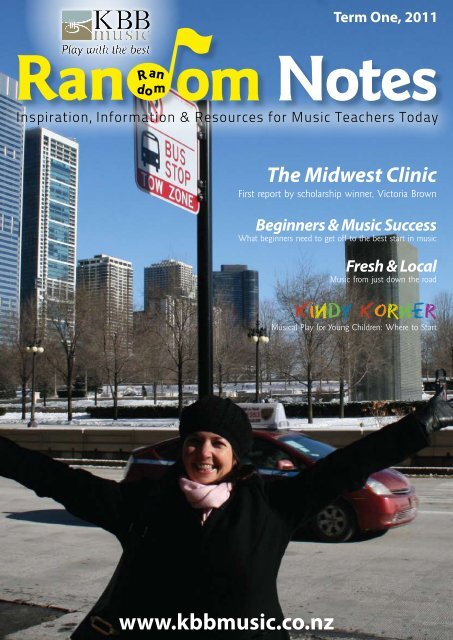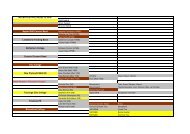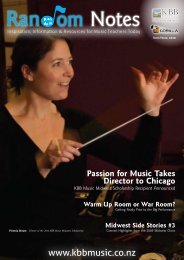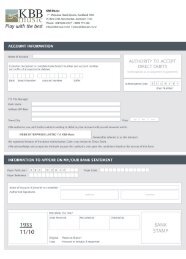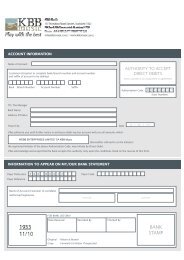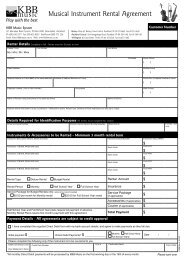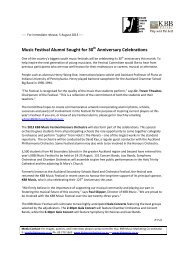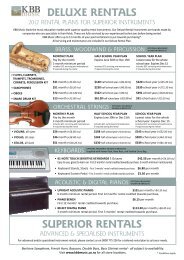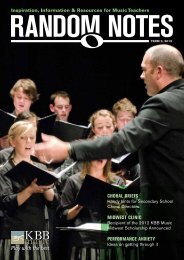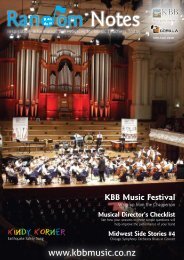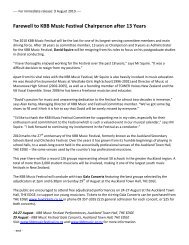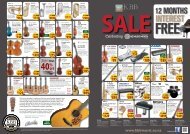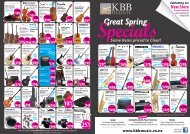2011 KBB Music Festival
2011 KBB Music Festival
2011 KBB Music Festival
Create successful ePaper yourself
Turn your PDF publications into a flip-book with our unique Google optimized e-Paper software.
Ran om NotesandoRmTerm One, <strong>2011</strong>The Midwest ClinicFirst report by scholarship winner, Victoria BrownBeginners & <strong>Music</strong> SuccessWhat beginners need to get off to the best start in musicFresh & Local<strong>Music</strong> from just down the roadKindy Korner<strong>Music</strong>al Play for Young Children: Where to Startwww.kbbmusic.co.nz
“Meeting and performing withother musicians from aroundthe world at one of thefestivals and playing in thelikes of the Sydney OperaHouse is what we offer.”SIMON HOCKINGMUSIC GROUP TOURS SPECIALISTSimon Hocking House of Travel<strong>Music</strong> Group ToursChoir • Barber Shop • Orchestra • Jazz Band • Concert Band • Brass BandCombine music with culture and relaxation on your school group music tour. With 30 yearsexperience in arranging music tours we can personalise your tour itinerary to meet yourbudget and make sure your itinerary has an exciting mix of performance, social and culturalopportunities, so your tour will be artistically rewarding, memorable and fun!Packages can include:• Flights• Accommodation, as specified by you, or as suggested by us• “Home-stays” where available• Meal packages for breakfast only, or with lunch and dinner options daily• Coach transport (trailers can be arranged where required)• Concert venues, school exchanges and master classes where requested• <strong>Festival</strong> packages where available• A wide selection of sightseeing and cultural activities• Comprehensive printed itinerary booklet which contains your school rules,cultural guidelines and other information• Comprehensive insurance cover2012 <strong>Festival</strong> OptionsNZ <strong>Festival</strong>s • Singapore Easter MUSE, Concert Bands, Orchestra • Hawaii Easter ConcertBands • Sydney July Concert Bands, Choir, Orchestra • Brisbane June Concert Bands, Choir• USA May/June Choir, Concert Bands • 2012 London Olympic opportunities • Concert Band& Choral <strong>Festival</strong> April • Choral <strong>Festival</strong> JulyWe have many more that will suit your music group.Booking Now! China Tour, Choral Cruise 12-26 September <strong>2011</strong>Call 0800 505 565 or email simonh@hot.co.nz for more details onpersonalised group tour packagesSIMO-0009Simon HockingNorthtown Mall, Timaru | 0800 505 565 | simonh@hot.co.nz | simonhocking.co.nz
<strong>2011</strong> <strong>KBB</strong> <strong>Music</strong> Makers CatalogueIn this Issue...<strong>KBB</strong> <strong>Music</strong>’s latest Education ResourceCatalogue is out now!<strong>Music</strong>al Play for YoungChildren: Where to Start5<strong>2011</strong> <strong>KBB</strong> <strong>Music</strong>Midwest ScholarshipApplications close 30 April <strong>2011</strong>This year’s <strong>Music</strong> Makers Catalogue is bigger thanever as we bring you an even more extensive range ofproducts.A copy has been sent to your school or organisation.If you have not received a copy, please contact us on0800 775 226 ext 205 or email school@kbbmusic.co.nzwith your name and name of your school for your freecopy.If you are a music teacher or director of youth concertbands and orchestras in New Zealand, we welcome you toapply for the <strong>2011</strong> <strong>KBB</strong> <strong>Music</strong> Midwest Scholarship. This isa unique professional development opportunity with thestrongest consideration given to those whose attendancewill create the greatest benefit to Youth <strong>Music</strong> in New Zealand.The 65th Midwest Clinic will be held on 14-18 December <strong>2011</strong> at Chicago’s McCormickPlace West, USA.See pages 10-12 for the 2010 <strong>KBB</strong> <strong>Music</strong> Midwest Scholarship winner, Victoria Brown’soverview of the 2010 Midwest Clinic.For more information and application form, please visit www.kbbmusic.co.nzRecent <strong>KBB</strong> <strong>Music</strong>-Assisted Funding SuccessesCongratulations to:Churchill Park School(Auckland) ........................................ $3,450Henderson Intermediate School(Auckland) ........................................ $5,750Wilford School(Wellington) .......................................... $3,700<strong>KBB</strong> <strong>Music</strong> has assisted schools and bands withfunding to the tune of over $900,000 to date! Wantto know how your music department can get a fundingboost?Contact Fung Lim on 0800 775 226 ext 201 orfung@kbbmusic.co.nz for helpful funding informationtoday!See page 12 for Queenspark School’s recent fundingsuccess story.Thanks to our Advertisers - please support them!Thanks to Monaco Corporation Ltd. and Simon Hocking House of Travel for helping us keepRandom Notes free for school music teachers nationwide.<strong>KBB</strong> <strong>Music</strong> <strong>Festival</strong> Update 6The 4th NZ Ukulele<strong>Festival</strong> 2010NZ Concert BandAssociation UpdateFresh & Local - <strong>Music</strong> fromjust down the roadThe Midwest Clinic. Wow.Just, wow.$3,000 Funding forQueenspark SchoolLooking after yourTrumpetBeginners need High-QualityInstruments to Succeed<strong>Music</strong> Director’s ChecklistPart 2 of 378910-12121314-1517Term 1 Specials 18-22Would you like toreceive Random Noteselectronically?If you would prefer to receive the nextissue of Random Notes, occasionaleducation specials and product informationby email, simply emailjennifer@kbbmusic.co.nz with:• Your name• Your email• The name of your school• Your position within the school• ‘Random Notes Online’ in thesubject line• Indication of whether you or othermembers of your department wouldstill like to receive a hard copy ofRandom Notes<strong>Music</strong>al Instrument Specialists since 1888 3<strong>KBB</strong> <strong>Music</strong> Freephone 0800 775 226
<strong>KBB</strong> <strong>Music</strong> is one of NewZealand’s leading musicstores. Celebrating its123rdanniversary in <strong>2011</strong>, <strong>KBB</strong><strong>Music</strong> has the country’slargest range of brass andwoodwind instruments,while also supplying allother musical instruments& equipment to musiciansnationwide.andom<strong>KBB</strong> MUSIC LTD.157 Manukau Road, EpsomPO Box 9788, NewmarketPh 09 630 2577 or 0800 775 226info@kbbmusic.co.nzwww.kbbmusic.co.nzRandom Notes is a free quarterlynewsletter especially created formusic teachers in schools andeducational institutions in NewZealand.If you would like to:• Place an order - please emailschool@kbbmusic.co.nz or call0800 775 226 ext 205 for MitchGolner.• List an Event or <strong>Festival</strong> - pleaseemail jennifer@kbbmusic.co.nz orphone 0800 775 226 ext 212 withdates and a brief description.• Make an advertising enquiry -please email jennifer@kbbmusic.co.nz or phone 0800 775 226 ext212 for Jennifer HsuFront cover photo:Victoria Brown (winner of the2010 <strong>KBB</strong> <strong>Music</strong> Midwest Scholarhip)in Chicago, USA, for theMidwest Clinic.R<strong>Music</strong>al Memos CalendarMARCHHamilton Flute <strong>Festival</strong>12-13 March, Fairfield Intermediate. A weekendof workshops, masterclasses, ensemble playingand performances featuring Altus Flute artistGeorge Pope (USA). Contact Kathryn Orbellkjorbell@flute.co.nz for more information.APRIL‘Cultural Chords’ National <strong>Music</strong> Conference18-20 April, Quality Hotel Barrycourt, Parnell,Auckland. A conference for Primary andSecondary teachers teaching through and withmusic in their classrooms. Registration close18th March, <strong>2011</strong>. For more info visitwww.trcc.org.nz10th Early Childhood Convention <strong>2011</strong>26-29 April, Otautahi, Convention Centre andTown Hall, Christchurch. For more informationvisit www.ecconvention<strong>2011</strong>.org.nzMAY - NZ <strong>Music</strong> Month<strong>KBB</strong> <strong>Music</strong> Workshops & Instore ConcertsVisit www.kbbmusic.co.nz for upcoming NZ<strong>Music</strong> Month events at <strong>KBB</strong> <strong>Music</strong>.JULY<strong>KBB</strong> <strong>Music</strong> Young Performers’ Competition Final2 July, Philharmonia Hall. A public concert withperformances by the Finalists of the <strong>2011</strong>Competition. Open to all Secondary Schoolstudents of orchestral instruments. For moreinformation, please visit www.kbbmusic.co.nzNZ Concert Bands <strong>Festival</strong> (NZCBA)8-9 July, New Plymouth. Annual festival forconcert bands. For more details, please contactDon McLaurin, NZCBA President,don.mclaurin@npbhs.school.nzNZCT Chamber <strong>Music</strong> Contest Finals15 July, Semi Finals16 July, National FinalsBoth events will be held at WEL Energy TrustAcademy of Performing Arts, University of Waikato.Visit www.chambermusic.co.nz for more information.National Brass Band Championships20-24 July. North Shore, AucklandVisit www.brassnz.co.nz for details.AUGUSTWaikato Band & Orchestra <strong>Festival</strong>5 August, WEL Energy Trust Academy of PerformingArts, University of Waikato, Hamilton. For moreinformation contact <strong>Festival</strong> organiser John Wrightheatherandjohn@clear.net.nz<strong>KBB</strong> <strong>Music</strong> <strong>Festival</strong>9-13 August (TBC), Aotea Centre, THE EDGE (TBC)A real celebration of youth music. Visitwww.kbbmusic.co.nz or contact Sally-Ann Russellrussell.sallyann@gmail.com for more information.Big Sing Finale29-31 August, Christchurch Town Hall.Visit www.nzcf.org.nz for more information.SEPTEMBERNZ Woodwind Competition16-18 September, Raye Freedman Arts Centre,Auckland. Annual competition for Primary,Intermediate, Secondary, Tertiary and Adult studentsof the Saxophone, Flute, Clarinet, Oboe and Bassoon.Entries close 15 July <strong>2011</strong>. Visit www.flutefocus.com/woodwind-competitions.html or contact MaryO’Brien mary@flutefocus.com for more information.If you would like to have your event or festival listed in <strong>Music</strong>al Memos, please send dates anda brief description of the event to jennifer@kbbmusic.co.nzThe New Zealand Woodwind Competitions is an annual national competition forPrimary, Intermediate, Secondary, Tertiary and Adult students of the saxophone, flute,clarinet, oboe and bassoon. Great prizes from our sponsors are given out each year.Now in its 4th year, the Competitions go from strength to strength, encouragingstudents at all levels with their musical development . Once again, all competitorswill be given the opportunity to compete in a supportive environment, gain valuableexperience and feedback, and have the option to use this performance opportunity foran NCEA or University assessment - plus as always the chance to win fabulous prizes!16th – 18th September, <strong>2011</strong>Raye Freedman Arts CentreSilver Rd, Epsom, AucklandClosing dates for entries - 15th July <strong>2011</strong>.Contact information: Mary O’Brien, NZ Woodwind Competitions OrganizerPhone: +64 27 676 8741, Email: mary@flutefocus.comAll information can be found at http://www.flutefocus.com/woodwind-competitions.htmlFor regular updates please follow us on Twitter http://www.twitter.com/flutefocus.www.kbbmusic.co.nz4 Printed on Paper from Sustainable Forests
Kindy KornerEARLY CHILDHOODandomR<strong>Music</strong>al Play for Young Children:Where to Start?By Louise van Tongeren & Julie Wylie, www.juliewyliemusic.com ©Julie Wylie <strong>Music</strong>Julie Wylie’s work in Early Childhood music is internationally recognised, and heraward-winning CDs and DVD are highly sought after by families and teachers.Julie and Louise are Pediatric <strong>Music</strong> Specialists at The Champion Centre, EarlyIntervention in Christchurch and run music classes for babies through to 7 yearolds at their music school. Julie Wylie is in strong demand as a presenter all overthe world and is available to help schools, therapy settings, community groupsand teachers understand the art, science and psychology of music in earlychildhood and special education.The start of the school year is a great time to reflect onhow we are using music in early childhood, and in classroomsettings where the children are still very young, and to thinkabout what we can do to nurture children’s musicality.It is particularly important to reflect on the child’s holisticmusic development if your music programmes are focusedon teaching instruments to young children – for example:the ukulele and recorder. Additional musical play time willsupport their learning not only on these instruments but inall areas of development.<strong>Music</strong>al Play Should be Fun: For young children,music activities should be focused on nurturing children’sinnate musicality, allowing them opportunities to explore theelements of music, developing creativity through following thechildren’s ideas and including improvisation in play, helpingthem become immersed in the musical experience andcreating a sense of fun within a calm environment.Percussion Instruments are a great way to geteveryone involved, help children comeinto sync and develop a strong senseof rhythm - especially if they can beaccompanied by a guitar or piano.Children Learn Through Their Bodies: Selectactivities that get children moving and responding to musicwith their whole bodies. Rhythm, pitch, form – all of theseelements are first learned in the body and then related toformal music.Maracas are a wonderful resource fordancing; exploring high, low, fastand slow; learning about their ownspace and bodies; exploring differenttempos and styles.Children Love Interesting <strong>Music</strong>: Consider themusic that you are using carefully – children’s brainsadore interesting rhythms, styles, harmonies and scales.Much of the music that children are exposed to is verybasic (often Major and in 4/4) yet we see childrenresponding with great excitement to Latin-Americanmusic, songs in 5/4, Blues music, dancing to changes intempo and style and exploring the minor scales.Chime Bars are a great resource forexploring interesting scales andintroducing the idea of Major / Minorand modes. Children enjoyplaying together with thePentatonic scale andmaking up their own songs.<strong>Music</strong>al Instrument Specialists since 18885<strong>KBB</strong> <strong>Music</strong> Freephone 0800 775 226
andomR<strong>KBB</strong> MUSIC FESTIVAL<strong>2011</strong> <strong>KBB</strong> <strong>Music</strong> <strong>Festival</strong>UpdateBy Dr Trevor Thwaites, Chairperson of the<strong>KBB</strong> <strong>Music</strong> <strong>Festival</strong> Committeeelcome to the <strong>2011</strong> <strong>KBB</strong> <strong>Music</strong> <strong>Festival</strong> column of RandomNotes. I am writing this in my new role as Chairman ofthe <strong>Festival</strong> Committee, a committee I feel privileged to bea part of. I am also privileged to be following David Squire in this role, arole in which he excelled. I trust that I will not disappoint. I will also missMichael McLellan’s presence on the committee, we have a professionalrelationship that goes back many years and his dedication to fine musicin Auckland has been an inspiration to music education.I would also like to welcome Sally-Ann Russell in her role asAdministrator and Sally-Ann advises that she is happy to take anyqueries at email: russell.sallyann@gmail.com.At the moment I am reading <strong>Music</strong> and Sentiment by CharlesRosen (2010, Yale University Press) and he sees sentiment and affectas having a similar meaning. I would like to share an observation hemakes: “language must seek out poetic methods even to approach at adistance the subtlety and emotional resonance of music.” The impactof emotion on knowing is the great advantage music has over all otherforms of knowledge and expression, and most of us, I would hope, haveat some time been affected by music. This affect can contextualize thesituations in which we have been affected and bring back the memoryof our emotional/felt response at the time. <strong>Music</strong> has the power toorganize our memories and experiences and to bring out emotions inboth our individual and collective memories. This will undoubtedly bethe same for the students you enter in the <strong>KBB</strong> <strong>Music</strong> <strong>Festival</strong>. These areexperiences that are never forgotten and often their memory can bolsterresolve as one moves through life.The power of music to motivate both individual and collectiveemotions into action has at times been seen as a threat to authority. InClassical Greece, both Pythagoras and Plato were very aware of music’spower, hence Plato’s well-known warning that: “<strong>Music</strong>al innovation isfull of danger to the whole State...when modes of music change, thefundamental laws of the State always change with them” (The RepublicIV, p. 425). He was not just speaking about the kinds of scales and modesthat could be used, but also the rhythmic modes. And the Greeks weren’tthe only ones. The rulers of Imperial China, for example, only authorisedthe forms of music that would assure good order in society, and the stateprohibited those forms that might trouble the people.You can rest assured that this little discussion is not meant toimply that the Committee is about to impose bans on the kinds ofkeys and metres you select for your entries this year for fear you mightbecome a threat to the <strong>Music</strong> <strong>Festival</strong> organisers. But on that note I willreturn to Rosen’s book. Here’s what he has to say about consonanceand dissonance: “Dissonance establishes an increase in tension, andconsonance a release. Strictly viewed, everything in a tonal piece is moreor less dissonant except for the tonic triad with which the work mustend” (p. 9). The message is clear. If you’re planning to perform a “tonalpiece” why not start with the final chord – get the group to securelyinternalise its tones, that way they will keep in mind where the piece isheaded and be aurally secure about the sound of the final resolution.Even if everything in the piece turns to discordant disaster, you’re goingto be in tune at the end!So get your groups rehearsing, but be careful out there, there areliteracy educators behind every rubbish bin (they use them to file theabundance of tests they are obliged to give). Think about the powerof music, it can be a form of resistance—especially in resisting themundane and the clichéd—it has the power to change people and it canchange the world.Dr Trevor ThwaitesChairperson<strong>KBB</strong> <strong>Music</strong> <strong>Festival</strong> Committeet.thwaites@auckland.ac.nzwww.kbbmusicfestival.co.nzFor all enquiries regarding the <strong>2011</strong> <strong>KBB</strong> <strong>Music</strong> <strong>Festival</strong>, please contact<strong>Festival</strong> Administrator, Sally-Ann Russell russell.sallyann@gmail.comThe <strong>KBB</strong> <strong>Music</strong> <strong>Festival</strong> is proudly sponsored by<strong>2011</strong> <strong>KBB</strong> <strong>Music</strong> <strong>Festival</strong>For more information on the festival, please contactSally-Ann Russell, <strong>Festival</strong> Administrator,russell.sallyann@gmail.com or visit www.kbbmusic.co.nzwww.kbbmusic.co.nz6 Printed on Paper from Sustainable Forests
The 4th NZ Ukulele <strong>Festival</strong> 2010By Mary CornishandomRUnder a clear blue sky last November,the New Zealand Ukulele <strong>Festival</strong>got off to a rousing start when over2,200 children from Auckland, Northland,Waikato and as far as the Manawatu proudlywaved school banners and mascots as theymarched around the track of the Trusts Stadium,Waitakere to the rousing pulse of Cook Islanddrumming and the cheers of the 10,000 strongcrowd. They were the Kiwileles, now the world’slargest ukulele orchestra! With heads heldhigh, big smiles and instruments aloft, theyhad gathered to celebrate a year of musicalachievement – for many their first year oflearning to play an instrument.The Kiwileles shared the billing withnational and international artists playing a widespectrum of musical styles. The three APRAUke-Can-Do-It song-writing finalists performedtheir songs and received their prizes. Thiscompetition was open to primary, secondaryand adult entrants and the judges were veryimpressed with the high quality of entries fromthe school-aged participants, which bodes wellfor the future of kiwi music! Over at UkuleleWorld, a second indoor stage, performancesfrom community uke groups from Aucklandand beyond strummed up a storm to capacityaudiences. The chilled out crowd enjoyed a dayof non-stop entertainment including an NZMCsponsored set from Three Houses Down,workshops, industry stalls (yes<strong>KBB</strong> <strong>Music</strong> and Gorilla Guitars“ We are the champions! “ Lee Barry and her Kiwileles from Newmarket Primary School join the Grand Parade.& Drums were there!) food, giveaways and thechance to join in the Great Kiwi Uke Along -complete with hula dancers. MC Pio and sonTeina hit just the right note and kept the dayhumming along.With an emphasis on fun, family,community and inclusion the New ZealandUkulele <strong>Festival</strong> is a unique event on thefestival calendar with school, amateur andprofessional performances given equal respect– ukuleles know no boundaries! This yearsfestival has been pencilled in for 26th ofNovember.For more information about the work ofthe NZ Ukulele Trust and how you or yourschool can be involved visitwww.nzukulelefestival.org.nz orcontact Maria Winder atkiwileles@nzukulelefestival.org.nz •Thinking of starting a uke group at your school? Here are some tips.• Invite students of a targeted age group to sign up for ukulele e.g. Year 3-4, 5-6, 7-8 or year 9-10.• Start with ukuleles tuned and ready to go – NZ Ukulele recommends the most common tuning of G C E A.• Sing and pluck: Giraffes Can Eat Anything (more useful that My Dog Has Fleas as it names the open strings).• Strum some easy one or two chord songs to get everyone playing and singing. C requires one finger on one fret – super easy!• Identify the more rhythmic strummers and scatter them in your group. Two enthusiastic out of time strummers can create a lot ofhavoc!• Start with Down / Down / Down / Down with a relaxed wrist and fingers.• 1 chord songs: Frere Jacques, Row Row Row Your Boat• 2 chord songs: Ma is White (Maori colours song), I Have a Dream (by ABBA)• Split the students into two groups. One plays C, one plays G7. This gets them underway quickly; they keep their fingersin one chord position for the entire song and only play when it is their turn. Repeat and have them swap the chord.Repeat again and swap half way through. Try this when ready with three chords.• Teach the C / G / a minor / F chord sequence and you will have an endless supply of popular four chord songs to singand play providing lots of opportunities for repetition!• For students who need extension – add a vocal harmony and/or an instrumental picking part e.g. intro, riff, outro,and teach them chords in different positions.• Have a couple of concert or tenor ukuleles in your ensemble if you can to add some warmer tones. A simple bassline is always a bonus.• Don’t forget to sing… and you won’t be able to stop yourself from smiling when you play the ukulele!For a great selection of school ukuleles from just $29.70 each, see page 30 of your <strong>2011</strong> <strong>KBB</strong> <strong>Music</strong> Makers Catalogue.<strong>Music</strong>al Instrument Specialists since 18887<strong>KBB</strong> <strong>Music</strong> Freephone 0800 775 226
andomRNew Zealand Concert BandsAssociation UpdateBy Don McLaurin, President of the NZCBAThis newsletter is to provide you with information regardingchanges and developments within the New Zealand ConcertBands Association.• The Executive Committee is pleased to announce that the <strong>2011</strong>National <strong>Festival</strong> will be held in New Plymouth on Friday andSaturday 8th and 9th of July. We realise this is early but there areno major conflicts (Brass Band Association, Big Sing regionals andnationals, <strong>KBB</strong> <strong>Music</strong> <strong>Festival</strong>, Tournament Week). For school bandsthat is week 21 of 39. Because of the Rugby World Cup, August becameover-booked as we tried to secure the Waikato University Hall. Weknow from past experience that the best festivals are a product of astrong local committee and a large number of participating bands.The 2010 <strong>Festival</strong> in Hastings is a perfect example of that! We in NewPlymouth are keen to host a great festival with the local committeedrawn from Boys’ and Girls’ High School staff as well as the GreatTaranaki Steam Band. We look forward to your band being here!• <strong>Festival</strong> Information: The best source of information regardingNew Plymouth can be found at www.newplymouthnz.com. Thereare links for everything from accommodations to maps to be foundunder “Visiting New Plymouth.” There is also a place on this websiteto request hard copies of any information listed there. Very soon wewill provide information to members via our own website and a webaddress for the local committee.• We are pleased to welcome Andrew Stopps as the newest memberof the Executive Committee. We all benefited from Andrew’s musicalexperience and expertise as he served as one of our 3 adjudicatorsat the 2010 National <strong>Festival</strong> earlier this year in Hastings. Andrew isa new import to New Zealand from Sydney where he was Head of<strong>Music</strong> at the Australian International Performing Arts High and is nowDirector of <strong>Music</strong> at Scots College in Wellington. He has been involvedwith Concert Bands since he first started playing clarinet and beenconducting them since he was 18. Since then he founded the PirieYouth Concert Band, was conductor or the Adelaide University WindEnsemble (A Grade National Champions for 6 years), <strong>Music</strong> Directorof the Combined Districts Concert Band in Perth and more recentlyfounded the Wellington City Concert Band. He was also founder ofthe Northern Band <strong>Festival</strong> in South Australia. He is also a professionalarranger and composer when he finds the time. Welcome Andrew!• We are also pleased to announce the appointment of Sean Cole asthe new Webmaster for NZCBA. He has strong credentials as a webdesigner and will serve us in an on-going capacity in order for us toprovide a vibrant, up-to-date website! Our website will be back soon atwww.nzcba.com• We welcome our new Treasurer, Shelley Roche and look forwardto a long and successful working relationship with her. The previousTreasurer, Raewyn Wolf recently resigned because she and herhusband had acquired a new family business.• Our new Secretary is Christine Jeffs. Christine has been a memberof the Executive Committee for 5 years and brings her experience withNZCBA as well as a wealth of secretarial skills to this position.• The 3rd Annual Seniors Band is scheduled for 25-27 March <strong>2011</strong>in Masterton. This year’s Conductor, John Snowling will bring his vastmusical and banding experience to the podium for what promises tobe a terrific weekend of music-making! All interested band membersat least 40 years “young” please contact the organiser, Judy Livingstondirectly at: Judyl@gdc.govt.nzLastly, I want to reiterate my call for volunteers! You can always serveon a committee without being a member of the Executive Committee.If you are interested in working on behalf of NZCBA we will find a wayfor you to serve!All the best for a wonderful start to your year!Don M. McLaurinPresident, NZCBAThe major sponsor of NZCBA isPolytuneDr. BetotteFiReShazamiPhone Appsyou can use in classKnow a cool Appyou’d like to share?Let us know by email!jennifer@kbbmusic.co.nzThanks to Peter Thomas andMatt Walsham for sharing theirfavourite Apps with us!The most significantdevelopmentin electronic pedaltuners in the last10 years is nowavailable as an iPhone app.Tunes all six strings simultaneously!Just place the iPhonenext to your guitar, strum allsix strings at once and thisamazing app will show youwhich strings are out of tune.PolyTune is also a chromatictuner.A handy multidivisions programmablemetronome/beat-boxprogramme. Youcan create any kind of complicatedrhythms for practicing andsave it for use later, you can evencreate your own sound-sets.5 volume sliders and mutebuttons give you control overcrotchet, quaver, semiquaver,triplet and beat note sounds.Turn youriPhone into aprofessionalfield recorder!Record rehearsals, concertsfor replay later. It’s powerfulenough for the mostexperienced musicans andrecording engineers, andits efficient workflow andintuitive interface makes ita breeze to use.You know whenyou hear a songplaying anddon’t knowwho sung it? Just startup Shazam!, point it inthe direction of the musicand within a few seconds,Shazam will tell you thename of the song, the artistand the album it was from.Simply astounding technologyand very useful indeed!www.kbbmusic.co.nz8 Printed on Paper from Sustainable Forests
Fresh and Local- music from just down the roadandomRBy Glenda Keam, President of theComposers’ Association of New ZealandMahinarangi Tocker Source: Dominion Post Jenny Wollerman Photo: Monty Adams Lyell Cresswell Photo: TrustCDsIf you are the kind of thoughtful soul whocares about impact on the environment,then you’ve probably considered the‘air miles’ that any given product on thesupermarket shelf has clocked up before itgot to your local store. So what about the‘air miles’ on the music you listen to? Is yourmusic consumption eco-sustainable? Here’s asort of ‘local farmer’s market’ guide to some ofthe music you may enjoy this year:The Auckland Arts <strong>Festival</strong> (2nd – 20th March)offers a range of musical treats from far andnear, including Charlotte Yates’ new project“Ihimaera”. The creator of the “Baxter” projectof 2000 and “Tuwhare” of 2006 is bringingtogether the diverse musical talents of KingKapisi, Horomona Horo, Teremoana Rapley,Victoria Girling-Butcher, Warren Maxwell, SeanJames Donnelly and others to create songsaround Witi Ihimaera’s writings (3rd – 5thMarch, Auckland Town Hall/TelstraClear PacificEvents Centre).Also in the Auckland <strong>Festival</strong>, a musicalexchange between NZ composers GillianWhitehead and Jack Body and two Cambodiancomposers offers a strong musical reflectionon Cambodia’s turbulent history, performedby the NZTrio and Cambodian traditionalperformers (17th March, Concert Chamber).John Psathas, the Auckland PhilharmoniaOrchestra’s composer-in-residence, hascomposed a new symphonic work TheNew Zeibekiko which celebrates the Greek‘zeibekiko’ dance form. The work will bepremiered in the Auckland <strong>Festival</strong> by the APOtogether with traditional Greek soloists ManosAchalinotopoulos and Vagelis Karypis (18thMarch, Auckland Town Hall).The APO’s schedule of concerts for the rest ofthe year includes Ross Harris’ new SymphonyNo.4, dedicated to the memory of the lateMahinarangi Tocker. The work features poetrythat West Auckland’s much-missed singersongwriterwrote and sent to Harris (7th April,Auckland Town Hall).“APO Amped!” promises the APO is ‘ready torock’ with a programme that brings togetherthe special talents of Warren Maxwell (LittleBushman, TrinityRoots), jazz saxophonistNathan Haines and composer John Psathason 3rd May at the Auckland Town Hall. Thesecollaborations will also be featured in theorchestra’s Secondary Students’ educationprogramme.Lilburn’s Processional Fanfare will openthe NZ Symphony Orchestra’s “Apotheosis”concerts across the nation in March/April,in a programme that finishes with Mahler’s4th Symphony, featuring the voice of NZ’ssuccessful soprano Anna Leese.NZ <strong>Music</strong> Month will bring the NZSO’s annual“Made in NZ” concert of all-local music toAuckland (28th May) as well as Wellington(13th May) this year. The programme willpresent new works by Ross Harris and ChrisGendall, and a new piano concerto by LyellCresswell featuring NZ pianist Stephende Pledge, as well as Anthony Ritchie’s AShakespeare Overture, Five Shakespeare Sonnetsby Gareth Farr, and Douglas Lilburn’s FourCanzonas.The NZSO’s “Odes to Joy” concerts inSeptember will join with the forces of fourvocal soloists, the Voices NZ Chamber Choir,and members of the nation’s regional choirs,to perform a new work by Gareth Farr in aconcert alongside Beethoven’s Symphony No.9, and their “Gala Evening” with Kiri Te Kanawa,scheduled for Auckland’s Vector Arena on22nd October, promises to include “some ofthe treasures of New Zealand’s own musicalheritage”.In November, the Voices NZ Chamber Choirwill also bring to five NZ cities their “Voicesof Aotearoa”, fresh from presenting this sameprogramme at the World Choral Symposiumin Patagonia. The concerts will feature musicby established local composers David Griffiths,Gillian Whitehead, John Psathas and JackBody, together with folksongs from furtherafield.Under the auspices of Chamber <strong>Music</strong> NewZealand, in April/May the NZ String Quartetwill again join forces with stunning sopranoJenny Wollerman to present two programmesacross the nation, including The Abiding Tidesby Ross Harris that was premiered to greatacclaim in last year’s International <strong>Festival</strong> ofthe Arts.The Saguaro Trio (a young piano trio includingour own John Chen) will tour the nation inJuly and August, presenting two programmesand including a newly commissioned work byyoung composer Alwyn Westbrooke (formerlyof Christchurch). •<strong>Music</strong>al Instrument Specialists since 18889<strong>KBB</strong> <strong>Music</strong> Freephone 0800 775 226
andomR<strong>KBB</strong> MUSIC MIDWEST SCHOLARSHIPThe Midwest Clinic.Wow. Just, wow.By Victoria Brown, Recipient of the 2010 <strong>KBB</strong> <strong>Music</strong> Midwest ScholarshipMy journey to The Midwest Clinic (affectionately termed“Midwest” at the conference) began almost a year agowhen I contemplated submitting an application to <strong>KBB</strong><strong>Music</strong> for a scholarship that would pay two-thirds of the total trip toChicago, IL, USA.Upon application it would be fair to say I had no idea of the fullscale of this event. However, I decided to put the paper work in,keep my fingers crossed, and hope for the best.What an unreal moment it was to receive the phone call fromFung Lim and be advised that I had been successful in gaining the2010 <strong>KBB</strong> <strong>Music</strong> Midwest Scholarship! What ensued from here was abusy two terms at school (including a couple of musicals to MD andorganise, a handful of concerts, a nine day Performing Arts <strong>Festival</strong>and the normal end of year School Celebrations and performances)and the planning and preparation for this trip.Before I knew it School had finished, and I had a week to packand get ready to get on the big bird!USA – here I come, ready to be totally inspired and excited.Of course, I was heading to the Northern Hemisphere...to themiddle of one of the coldest winter snaps seen in a while in NorthAmerica. It was crazy that we were in the middle of a drought in theWaikato, and on arriving in Chicago, the city was blanketed in whitefairytale snow.Held at McCormick Place, Chicago (you HAVE to check it out– the facility is incredible, and like nothing in NZ http://www.mccormickplace.com/) Midwest is attended by a plethora of musicgeeks and band nerds. I was one of 15,000 attendees, and whata mixed collection we were! You can’t even begin to imagine thesheer numbers and the diverse range of musicians in attendance.To say the size of the entire event was overwhelming would be anunderstatement.Almost every musical walk of life was represented, includingSchool Band and Orchestra Teachers, Instrumental <strong>Music</strong>Administrators, Professional <strong>Music</strong>ians, Military <strong>Music</strong>ians andConductors, College and University Teachers, Students andAdministrators, <strong>Music</strong> Industry Representatives, Composers andArrangers and Grade School and High School <strong>Music</strong> Students.All 50 American states were represented in attendance withrepresentatives from more than thirty countries – includingAotearoa New Zealand!To keep adding to the size, imagine an exhibition hall with over350 Exhibitors who are only displaying musical wares (!!) in 565booths. It was a musician’s shopping heaven.In four days there were over 30 concerts and performancesstaged by thirty organizations from around the world. Grade school,middle school, high school, college, military, adult, and professionalgroups all presented concerts of the highest standard. 90 Clinicswere held by more than 70 clinicians who offered guidance andinspiration covering all facets of instrumental music.Knowing that this was going to be HUGE (and most likelyincredibly scary to begin with) I decided to register the eveningbefore the official programme began. I figured this would give me achance to see what the facilities were like, and get some bearings.For many of you, you may not be fully aware of what TheMidwest Clinic actually is. This International Band and OrchestraConference exists exclusively for educational purposes.The goals of this major event are:• To raise the standards of music education;• To improve the methods employed in music education;• To develop new teaching techniques;• To disseminate to school music teachers, directors, supervisors,and others interested in music education information to assist intheir professional work;• To examine, analyze and appraise literature dealing with music;• To hold clinics, lectures, and demonstrations for the bettermentof music education; and in general,• To assist teachers and others interested in music education inbetter pursuing their profession.Midwest definitely achieves these goals. There is nothing elselike this in the world, and with so much energy, passion, talent,experience and stunning music under one roof only great thingscan happen.www.kbbmusic.co.nzOn arriving in the evening at McCormick Place, I felt my eyesfill with tears of excitement as I could hear groups rehearsing andwarming up. I knew at this very instant that I was in for the mostincredibly rewarding few days.Think for a moment about your average conference pack. Nowmultiply the conference handbook five-fold. A 260 page, A4, colour,bound book was going to be my partner in crime for the next fewdays. The book not only had the schedule of events, but also noteson all the lectures and clinics, and profiles of each of the groups thatwere performing. With so many options (up to 5 things runningduring any one session) consulting the handbook was going to bethe only way to make decisions about what to see.I made the choice early on the see as many concerts as possible,while hearing quality lectures too. I wanted to see what the10 Printed on Paper from Sustainable Forests
andomRVictoria Brown inthe John HancockCentre in Chicagooverlooking LakeMichigan.“cream of the crop” sounded like here, and over the course of theconference I was moved to tears on more than one occasion by thepower of the music performed by school students and professionalmusicians alike. I was hungry to know how the school groupsperformed with such professionalism, and one of the first clinics Iattended gave me some great food for thought.Getting the best from our students is a constant challenge.In New Zealand there are not many school orchestra conductorswho can exist only as that, with their primary focus being thedevelopment of the orchestra, weekly rehearsal programmes,and performances. We are all aware that we are also instrumentalteachers and classroom music teachers (read: musical Jacks and Jillsof all trades), and our time is frequently torn, making it a challengeat times to really give our musical groups the time, attention andcare they need to grow and develop significantly.I believe that as musicians, educators and conductors it behovesus to inspire our students. Emily Freeman Brown’s presentationentitled “The Way to a Dynamic Performance: The Conductor asTeacher, Artist and Performer” was engaging, motivating, and hadme nodding and agreeing in my seat. It is so important for us toremember that we can do so many things to inspire our students,while giving them fun and meaningful musical and educationalexperiences.One of the first points Freeman Brown made was in regard tomusic/repertoire selection.“The key to success in creating a dynamic performance ischoosing pieces that you love and believe in completely.”As orchestra and band directors, this means knowing the goodfrom the bad, or the “not so good”. It also means being artisticallyambitious, whereby pieces are selected that allow us to teachaspects of artistry, interpretation and musicianship. Our repertoireselections must allow us to keep our practical pedagogical goalsat hand, and planning the year’s repertoire with long-term goals inmind can be a powerful strategy to employ. Of course, the musicneeds to be fun and exciting for our students.“Make sure the musical rewards of each piece are powerful enoughto warrant the work you and your ensemble will put into it! Theprivilege of playing great music is reward enough in itself.”We all know that our students will tell us quickly whether theylove or loathe the pieces we choose for them. Our enthusiasm,knowledge and passion for the works we choose will help themto love works that they may not have otherwise considered. Ourencouragement for them to be open to new and different musicwill help to shape more well-rounded musicians. As FreemanBrown pointed out, “none of us should listen in a vacuum.” She alsocommented that our ensembles seek our inspiration. We need tobelieve in the ultimate ability of the ensemble, and this in turn willinfluence our repertoire choices.Freeman Brown also outlined a series of points and guidelinesto consider (as conductors and directors) in rehearsal. These are asfollows:In Rehearsal:1. Empower your musicians and treat them with respect.2. Make a realistic rehearsal plan and don’t waste time.3. Instill a sense of potential and responsibility simultaneously.4. Demonstrate confidence with your musicians.5. Be demanding with a positive attitude.6. Keep the pace of each rehearsal quick without it feeling rushed.7. Balance each rehearsal between working details and playinglonger passages.8. Never let one section sit in silence for very long. If you findyourself doing this, you need sectionals!9. Set realistic goals for each rehearsal, and acknowledge what hasbeen achieved.10. Be clear about what the goals will be for the next session, andbe specific about what to practice before the next rehearsal.11. Don’t be afraid to tell your ensemble when something isn’t good.12. Know how well each individual in your ensemble plays. Use thisknowledge to “push” them to do their best.13. Don’t get into the habit of always being the “bad guy”, the onewho just says what is wrong.14. Try a different approach. If they miss a dynamic, say: “Please<strong>KBB</strong> <strong>Music</strong> Midwest Scholarship <strong>2011</strong>For more information and application form visit www.kbbmusic.co.nzApplication closing date: 30 April <strong>2011</strong>.“One of the most generous professional development opportunities for music directors in New Zealand’<strong>Music</strong>al Instrument Specialists since 188811<strong>KBB</strong> <strong>Music</strong> Freephone 0800 775 226
andomR<strong>KBB</strong> MUSIC MIDWEST SCHOLARSHIPnote the dynamic in bar...”. Wait a moment, in silence, and playthe passage again using your gestures to show (or emphasize)the dynamic.15. To fix balances, ask members of a particular section who has themost important part. Did they hear it well enough? Invite themto adjust and play it again.16. To correct rushing, have a section with a steady rhythm playwhile everyone else listens. Then repeat the passage witheveryone, including the “rushers”. This helps develop moreattentive listening.17. When intonation is a problem: in the case of a single line, havethem sing in a comfortable octave and tempo until they cando it correctly. Play it again slowly at first and then increasingthe tempo. If it is a chorale-like passage, have them sign theparts first and then play it. Doing this often, beginning withsimple parts develops basic reading skills in addition to a greatersensitivity to intonation.18. When rehearsing longer passages, it usually works to mentionup to three things at a time that need improvement, but notmore. When you do this, take the time to review what workedand what still needs improvement.I believe that one of the most exciting things we can do asmusic educators is Dare to be <strong>Music</strong>al. Take the risk. We are allpassionate about music, and music education. One of my goals for<strong>2011</strong> is to challenge myself and my students to make music – notplay notes, but make music. I want to motivate, engage, and inspirethe young musicians in my care, just as I have been motivated andinspired at Midwest. I’m going to challenge them to take musicalrisks, be adventurous, branch out – even if initially that only meanschoosing a different pop musician, or a new classical composer tolisten to.So... first impressions of Midwest?Want to know more? Look out for more Midwest Clinic articles by Victoria Brownin the next issue of Random Notes, and visit www.kbbmusic.co.nz$3,000 Funding for Queenspark SchoolQueenspark School music teacher Jackie Stafford on how she successfully sought funding for her marimba groupthrough <strong>KBB</strong> <strong>Music</strong>-assisted funding.For Queenspark SchoolBeaters Boomwhackers Bongos Cowbells Keyboard Metallophone <strong>Music</strong> Stands Recorders Tambourines Xylophones At the beginning of 2010 we started a small marimba group withthe view to performing at the Marimba <strong>Festival</strong> in October. As we werelimited to glockenspiels and one working alto xylophone, we felt thatit was time to make an application for funding to increase our marimbainstruments.While reading the <strong>KBB</strong> <strong>Music</strong> newsletter I read about how <strong>KBB</strong><strong>Music</strong> had assisted a school’s application for musical instruments. I gotin touch with Fung Lim to find out the process to apply for funding. Thisprocess was made so much easier by having Fung working alongside meall the way. It was a very time consuming effort but certainly worth it.Through Fung’s wonderful support and advice I was able to putan application together. My application was successful which then ledto how to spend the money! So many instruments to choose from! Onceagain I got in touch with Fung and we worked out what I could buy tostart a marimba group. We were able to make efficient use of the budgetthanks to Fung’s input.This group had been committed to practising twice a week on oldinstruments, some with missing notes. So when the new instrumentsarrived it was like opening presents on Christmas Day! The children hadso much fun and now have a much richer sound to their music. At theend of last term they made their debut at our school Showcase anddid a superb job of playing in front of an audience. It was great to havethe opportunity to demonstrate the new instruments to the schoolcommunity.A big thank you to Fung and <strong>KBB</strong> <strong>Music</strong> for their fantastic support.Their never- ending patience and advice on the phone and by e-maildid not make the process so daunting. It would not have been an easyexercise to do on my own. •For more information on how <strong>KBB</strong> <strong>Music</strong> can help your school with funding, contactFung Lim on 0800 775 226 ext 201 or email fung@kbbmusic.co.nzwww.kbbmusic.co.nz12 Printed on Paper from Sustainable Forests
INSTRUMENT MAINTENANCEandomRLooking After Your TrumpetHaving your instrument well-maintained and regularly serviced keeps it in optimum playing condition and reduces the riskof expensive repair bills. Here are some simple steps recommended by Michael Austin, <strong>KBB</strong> <strong>Music</strong> Technical Manager.Care & Maintenance Tips1. When new, the valves on the trumpet may not havebeen lubricated. It is important to place a few drops ofvalve oil on each piston before playing. Ask a technicianor your teacher as to the best method of application andfrequency required from then on.2. When inserting pistons. On most brands, if the number on the valvefaces the mouthpiece, the guides will fall into place.3. Insert the mouthpiece into the mouthpiece receiver directly. Do notinsert by twisting or pushing. Should the mouthpiece become stuck,<strong>KBB</strong> <strong>Music</strong> can remove this for free while you wait without damagingthe mouthpipe receiver. Do not attempt to use pliers or a wrench toremove the mouthpiece yourself as this may cause damage.4. Keep your mouthpiece clean at all times. An accumulation offoreign material inside the mouthpiece will alter theblowing qualities of the instrument. Mouthpiece brushesare available at <strong>KBB</strong> <strong>Music</strong>.5. The mouthpiece, valve casings and slides also mustbe kept free of accumulations. The instrument should bedismantled carefully and soaked in a warm (not hot) bathof water with a few drops of liquid detergent for abouthalf an hour. The insides of the slides and tubes can thenbe brushed with a flexible cleaner. Rinse the instrument in clean waterand then lubricate and reassemble. Ask your teacher if you are unsurebefore proceeding.6. All tuning slides should be greased periodically since they must bemoveable at all times.7. A periodic inspection and replacement of water key corks and valvefelts will help maintain correct adjustment for best response.8. Avoid eating sweets, chewing gum or drinking soft drinks beforeand during playing. If you do, rinse your mouth with water or cleanyour teeth before playing.9. Store your trumpet in your case or on a trumpet stand. Avoidexposure to extreme temperatures.10. A good care kit will help you maintain your instrument.For more advise on maintaining yourinstrument, call <strong>KBB</strong> <strong>Music</strong> on0800 775 226 ext 207 to speak to anexperienced technician.Repairs & Servicing•Brass & Woodwind Specialist TechniciansCall for a FREENo-Obligation Quote!•Qualified with over 40 years of experience•Fast and efficient turnaround.•High-quality workmanship at competitive prices•Education disounts apply for school repairsMichael Austin<strong>Music</strong>al Instrument Specialists since 188813<strong>KBB</strong> <strong>Music</strong> Freephone 0800 775 226
andomRFEATURE ARTICLEBeginners need High-QualityInstruments to SucceedJohn Whyte explaines why children will thank their parents for gettingthem to a good start with the best student instrument they can afford.“ Parents usually must be educated tothe fact that the choice of instrumentfor their child can have a majorinfluence on the child’s success or failure.”Why are you reading this column?Perhaps you’re a teacher, a performingmusician or someone involved in themanufacture, sale or repair of musicalinstruments. Whatever your line of work, it’ssafe to assume two things about you:1. You value music, and2. Given a choice, you prefer music of highqualityWe needn’t go far out on a limb inmaking these assumptions. After all, virtuallyeveryone values music, even those who don’tconsciously think about it. <strong>Music</strong> is pervasive inour society, every where at all times. And evenif we travel far from civilization, Mother Naturestill creates a symphony of sounds for us withbirds, water, wind and so many other elements.<strong>Music</strong> is a natural expression of our humanityand a reflection of our world. It is as much apart of us as breathing, as the beating of ourhearts. <strong>Music</strong> is life.www.kbbmusic.co.nzThe second assumption, that youprefer high-quality music, is clearly anotherno-brainer. Given the choice, everyoneprefers to experience “the best” in their lives,to be a winner. Perhaps that means beinga valedictorian of your class, a member ofa championship athletic team or top salesperson for your company.Quality is the main ingredient ofsuccess. And success is the main ingredientof happiness. Because definitions of successvary from person to person, happiness is ahighly individual state of mind. We can stillventure to say, though, that anyone’s definitionwould include high quality experience as thebenchmarks by which success is measured.We all have the ability of set prioritiesbased upon our value systems. Accordingly, weallocate our resources, including time, energyand money. If, for example, you wanted tobecome the best possible golfer, you mighttake lessons, subscribe to magazines, watchvideos and purchase a well-made set ofclubs. The clubs alone could cost thousandsof dollars, but you would justify the expensebecause high-quality equipment increasesyour chances of success and, consequently,happiness.By now you may be asking yourself,what does all this have to do with musiceducation? The answer, in a word, isplenty!Poor–quality equipment makesdevelopment of a new skillmore difficult. Itdoesn’t matterwhether thenew challenge islearning to playgolf or clarinet– the lower thequality of equipmentbeing used, the more difficultand frustrating the developmentof skills will be. Conversely, highqualityequipment will help anylevel of learner to improve, and it is especiallyimportant to the progress of a beginner.The beginner’s task is the most difficult.Everything is new, with every step a challenge.There are so many physical and mental tasks tomaster that the last thing a beginner needs isproblems with his or her equipment, which canturn an already difficult process into a series ofinsurmountable tasks. This is especially true inthe case of elementary-age students learningto play band instruments.The typical beginning band studentjuggles a busy schedule that begins with fivefull days of school each week. The studentthen fills his or her “free” time with jobs,“At every opportunity, parents should be encouragedto obtain the best student instruments they canafford. Their children will thank them – musically –every time they perform.”scouts, church groups, cheerleading, athletics,baby-sitting, choir, safety patrol, fund-raising,orthodontist appointments, paper routesand clubs ad infinitum. <strong>Music</strong>al activitiessuch as practicing, lessons, rehearsals andperformances must compete with all of theabove for students’ time, energy and interest.And it is virtually impossible to maintainstudents’ interest in their music if theirinstruments are of low quality and are difficultto play.Each year many students begininstrumental study with excitement andanticipation, only to be discouraged bythe frustration of playing poorly made orantiquated instruments that are incapable ofproducing a characteristic sound, even whenthe student is doing everything correctly. Thelist of potential problems inherent in low-gradeband instruments is virtually endless andcertainly too long to detail in this column.There are obvious steps that can betaken in advance, though, to ensure thatbeginning band students avoid the frustrationand eventual failure that can result fromattempts to learn on unplayable instruments.Parents of prospective music students shoulddo any of the following:14 Printed on Paper from Sustainable Forests
andomR1. Ask the school band instructor forrecommendations of good student-lineinstruments.2. Ask for recommendations at a local fullservicemusic store, especially if it has areputable service department.3. Ask the opinions of any respected privateteacher of the instrument they are consideringfor their child.Although some parents have enoughexperience with musical instruments tounderstand the need for high quality, most donot have that background and can easily makea mistake. Parents usually must be educatedto the fact that the choice of instrument fortheir child can have a major influence on thechild’s success or failure during the first weeksand months of instruction. This is especiallytrue when obtaining an instrument through asource other than a full-service music store.Risky instruments include those from arelative or friend, want ads, department storecatalogues and – worst of all – the attic. Ifparents feel they must obtain an instrumentthrough one of these sources in order tostay within budget constraints, fine, but theyshould then take the instrument on approvalto a music store or band instructor to receivean objective appraisal of the instrument’squality and value. At the same time, theycould get an estimate of what it would costto put the instrument back into good playingcondition, if necessary.The most obvious means of ensuringthat a beginning music student has a highqualityplayable instrument is to buy a newinstrument from a reputable full-service musicstore. A frequent alternative, appealing tomany parents, is to rent the instrument fromthe store, usually with the option to re-rent orto purchase it at the end of the semester or theschool year.To invoke an old maxim, you can’tmake a silk purse out of a sow’s ear. In otherwords, a poorly made instrument will alwaysplay poorly, no matter what steps are taken toimprove upon it. The bottom line is that a lowqualityinstrument will do the student moreharm than good, decreasing the student’slikelihood of success.At every opportunity, parents shouldbe encouraged to obtain the best studentinstruments they can afford. Their childrenwill thank them – musically – every time theyperform. •A native of Kenosha, Wisconsin,John Whyte has been a banddirector at the elementaryand secondary levels of theKenosha Unified SchoolDistrict since 1980 and is active asa private trumpet teacher, clinician and soloist. He receivedhis BFA from the University of Wisconsin (Milwaukee) andhis master’s degree from Carthage College (Kenosha).Mr. Whyte has been a U.S. Army Bandsman, principaltrumpet of the UW-Oshkosh Wind Ensemble, founder ofUW-Milwaukee Summer Winds and a student of MilwaukeeSymphony principal trumpeter, Richard Metzger. Thissummer, John was the first person to complete an intensive“externship” at Leblanc through the cooperative efforts ofthe Kenosha schools and Gateway Technical College.This article is is reprinted from Conn-Selmer KeynotesOnline Magazine with the permission of Conn-Selmer, Inc. All Rights Reserved. For more informationand a free online subscription, please visitwww.keynotesmagazine.comBACK TO SCHOOLDealsQuality Student InstrumentsXP Bb Trumpet• First slide saddle• Adjustable third slide ring• Lacquered finishHurry! Limited Time OFFER!Was $915$399JFL511ESSC• Sterling Silver Riser• Silver-plated body• Split EWOW!Was $1,150$799JAS567GL Alto Sax• High F#• Lacquered finishMost PopularItem!Was $1,499$999Hurry! Limited Time OFFER!by LeblancLB320VNPC Clarinet• Synthetic body• Slim, ringless design• Tarnish-resistant blacknickel keys• Valentino padsWas $1,215$799AWESOME DEAL!TS3100LQ Tenor Sax• High F#• Lacquered finishWas $2,449$1,7561492BEX Oboe• High-impact plastic body• Silver-plated keys• Basic Conservatory system• Range to low BWOW!Was $2,992$1,899Hurry! Limited Time OFFER!Call 0800 775 226 ext 205 to order. Offer available until 15 April <strong>2011</strong> or while stocks last.<strong>Music</strong>al Instrument Specialists since 188815<strong>KBB</strong> <strong>Music</strong> Freephone 0800 775 226
<strong>Music</strong>al Director’sChecklist Part 2Following Part 1 of this 3-part checklist, E. C. Mooreshares more tips on improving the performance of your band.andomRMore classic tips to improve the performance of your bandA truly great band is a combination of many factors, but the most importantmay be the personality and musicianship of the director. It is his orher duty to organize, teach, lead and inspire. Read through the list, andask yourself these questions. The answers may prove helpful to directorsseeking to improve their bands’ performance.Do you teach good posture?Breath is the soul of tone — as well as its support. Correct posture andgood breathing habits go hand in hand. Insist upon good standing andsitting posture, for these are basic to good breathing and breath control.Do you insist on good instrument position?Instruments are designed to be held in a certain way. When they are notheld in this standard position, tone quality, intonation and techniqueare adversely affected. Insist on good posture and correct position of theinstrument in the hands, and of the hands on the instrument. Correctfinger position is a basic requirement for rapid, comfortable technique.Do you watch embouchure formations?Watch the facial and embouchure formations of your students. When amalfunction becomes apparent, correct it at once. Proper facial and lipcontrol is essential to correct playing.Do you teach students to listen?All great wind instrument teachers agree that a beautiful tone is thefirst requisite of an artistic performance. A beautiful tone is the result ofmental alertness and concentration. Never allow students to play “a blurof notes.” Insist that they listen intelligently, critically and constructively,first to themselves and then to the band as a whole.Do you teach the mechanical and acoustical resources of eachinstrument?Many difficult passages are made easy when students understand thefull mechanical and acoustical resources of their instruments. Be sure toteach the use of all legitimate alternate fingerings and slide positions.Do you insist on proper attacks and releases?The correct use of breath and tongue is basic to a good technique.Students should not only be taught the basic styles of attack and release,but the director must insist that they be used according to the demandsmade by the music.Do you require a uniform and precise articulation?There are about twelve basic articulations, and every member of theband must understand each of them. The effect of a light staccato can beruined if one player uses the legato attack and release. Teach the basicpatterns, and insist upon precise articulation.Is your band well trained in basic rhythmic patterns?There are twelve basic rhythmic patterns that composers use over andover again. When these are played carelessly, both harmonic and rhythmicdistortion result. Teach your band a scientific, definitive method forcounting and beating time. Then, as each student plays consistently onthe right beat, basic rhythmic patterns will be precisely articulated.Does your band play afterbeats clearly, precisely and in tune?The playing of afterbeats is a neglected phase of ensemble performance.Ensemble tone can be seriously distorted when bass players puff theircheeks and “scoop” into every note. Inside parts are often similarly playedas players gasp for breath between each note. Afterbeat accompanyingpassages should be played phrase-wise, with the players breathing onlyat phrase cadences. The tonguing should be light and clean.Are inner voice parts heard clearly?The proper balancing of ensemble tone is essential if the principal voices,inner parts and bass line are to be proportioned correctly. This requiresthat students listen carefully “across the band” and observe faithfully theconductor’s dynamic indications.Does your band produce a good fortissimo sonority?A good band plays fortissimo without overblowing or allowing thesonority to get out of control. A fine conductor once said that a bandshould “never play louder than lovely.”…and a pianissimo?Even when a band plays softly, its tone must be projected with intensityand resonance. There is a sharp distinction between an intense, lovelypianissimo and a weak, timid tone. Pianissimos should have real carryingpower, even at “whisper” levels of sound.Does your band read fluently and accurately?When students read music well, they get real enjoyment and satisfactionout of playing together. Training in reading music should begin as soonas possible.Do you teach theory?Teaching students the basic principles of music theory helps them toread music better. Some knowledge of basic theory dispels much of themystery surrounding note reading.Do you teach proper phrasing?Phrasing, or “punctuation,” is important in making music intelligible andgiving it life and meaning. It is important to design correct breathingpatterns for wind instrument players, and to teach them to breathe at theright time and place in the music. •E. C. Moore, a prominent music educator, was author of The Band Book, first publishedby Leblanc Educational Publications in the 1960s and still in print today.This article is a revised excerpt from that publication.Look out for Part 3 of E.C. Moore’s <strong>Music</strong>al Director’s Checklist in the next issueof Random Notes. Part 1 was printed in the Term 4, 2010 issue.This article is reprinted from Conn-Selmer Keynotes Online Magazine withthe permission of Conn-Selmer, Inc. All Rights Reserved. For more informationand a free online subscription, please visit www.keynotesmagazine.com<strong>Music</strong>al Instrument Specialists since 188817<strong>KBB</strong> <strong>Music</strong> Freephone 0800 775 226
To order: Call 0800 775 226 ext 205 today!andomRRandom NotesTerm 1 SpecialsAll prices are inclusive of GST.See <strong>KBB</strong> <strong>Music</strong>’s <strong>2011</strong> <strong>Music</strong> MakersCatalogue for our full range.For your free copy, contact Mitch Golner,<strong>KBB</strong> <strong>Music</strong> School Sales Rep on0800 775 226 ext 205 or emailschools@kbbmusic.co.nz with yourname and name of your school.Wood Block WB-6Single tone on handle withbeater. School price $8.99Term 1 Special $ 6.50Bells BS-29 large bells in wooden frame.School Price $8.55Term 1 Special $ 6.99Double Castanet CAS-3Double castanets on woodenhandles. School price $8.99Term 1 Special $ 6.99Cowbell COW-15.5 in cowbell.School price $8.99Term 1 Special $ 7.45Triangle TR-38.5in cowbell.School price $8.10Term 1 Special $ 7.75Wood Block WB-2Large two tone block withhandle. School price $11.29Term 1 Special $ 8.99Maracas MA-1WLarge oval plastic maracas.School price $10.60Term 1 Special $ 9.95Tambourine TA-48” tunable tambourine with plastichead. School price $22.50Term 1 Special $ 21.00Tambourine TA-510” tunable tambourine.School price $26.99Term 1 Special $ 25.89Maracas MA-311” oval wooden maracas.School price $35.99Term 1 Special $ 29.95LIMITED STOCK!Bar Chimes BC-1RhythmTech 10-bar single rowchimes. School price $80.55Term 1 Special $ 73.95BOOMWHACKERbooks available.Please call0800 775 226 ext205 to enquire.Boomwhacker SetsSoprano DiatonicMetallophone SDMRange C2-A3 with a pair of beaters.School price $450.00Term 1 Special $ 385.00www.kbbmusic.co.nz 18Pentatonic Set BWPWSchool price $62.10Term 1 Special $ 51.00Bass Chromatic Set BWKWSchool price $99.00Term 1 Special $ 79.00Printed on Paper from Sustainable Forests
PRESS!STOPNew String Rangehas just arrivedMore shipments tocome!andomSV-175 Premier StudentViolin Outfit - 4/4 sizeR$349RRP $419Introductory Offer!Awesome value 4/4 size student violin designed to meet thespecific needs of beginning and advancing students. Featuressolid spruce top, flamed maple back, sides and neck, inlaidpurfling, ebony fingerboard and fittings. Includes high-qualityoctagonal Brazilwood bow, lightweight and durable casewith built-in hygrometer.To order: Call 0800 775 226 ext 205 today!GiuseppiStudentViolin OutfitARRIVINGSOONSchool price$169 15Place yourorder now!Maestro FirstViolin OutfitSV-12204/4 size. Made usingthe finest select woods,the Cremona Maestroviolins must be seen tobe believed!RRP $799$679.15Maestro MasterViolin OutfitSV-15004/4 size. Features 100+year old, hand-carvedsolid spruce top, mapleback and sides, inlaidebony purfling andincludes DeluxeTravelite case.RRP $1,699$1,444.15Premier StudentViola OutfitSVA-17516”. Features solid sprucetop, maple back, sidesand neck, inlaid purfling,ebony fingerboard andfittings. High-qualityoctagonal Brazilwoodbow included.RRP $429$364.65Premier StudentCello Outfit SC-1754/4 size. Features solidspruce top, mapleback, sides and neck,inlaid purfling, ebonyfingerboard. HighqualityBrazilwood bowand lightweightcello caseincluded.RRP $1,179Boston RecordersOur most popular recorder!Vinyl case, fingering chart andcleaning rod included.School price $6.50 eachBulkDeal!Buy 50+ for just$4.99 each!MANHASSET STANDSARE BUILT TO LAST!See page 21 of your <strong>2011</strong> <strong>Music</strong> MakersCatalogue for more music stands.<strong>Music</strong> Stand MSTS-1Our most popular foldablestand, perfect for practices.School price $22.50 each.BulkDeal!Buy 12+ for just$19.99 each!Manhasset SymphonyStudent Stands M4801Perfect for orchestras and bands.High quality, durable and lightweight.Made in USA.School price $84.96 eachBulkDeal!Buy 6+ for just$72.25 each!BulkDeal!Orchestral Stand MS-8RSturdy, height-adjustablewith a stackable base foreasy storage. Ideal forband and practice rooms.School price $54.00 each.Buy 10+ for just$49.00 each!Manhasset HarmonyStands M8101Stable and rugged stand withV-shaped stackable base fo easystorage. Durable and height-adjustable.School price $126.65 ea.BulkDeal!Buy 6+ for just$117.44 each!All prices are inclusive of GST19See your <strong>KBB</strong> <strong>Music</strong> Makers Catalogue for more products!
To order: Call 0800 775 226 ext 205 today!andomRJ&D Student UkuleleAwesome value coloured ukulelesideal for the classroom. These ukuleleshave geared machine head tuningpegs providing stable tuning. Includescarry bag.School Price $ 29.70 each<strong>KBB</strong> <strong>Music</strong>RecommendedKohala UKU-212S UkuleleAn outstanding student ukulele thatcomes with quality construction thatsurpasses all other ukuleles in this pricerange. Guitar-style machine head ensureseasy and stable tuning. Nato top,sides, back and fingerboard.School Price $ 50.00 eachSee page 30 of your <strong>2011</strong> <strong>Music</strong> Makers Catalogue for more ukuleles and ukulele accessories.Blitz Classic GuitarOur most popular school guitars! Greatvalue and comes with carry bag.1/2 size School price only $79 ea3/4 size School price only $89 ea4/4 size School price only $99 eaAria AW20 Acoustic GuitarSteel string guitars with spruce top,mahogany back and sides. Availablein Natural, Black, Blue or Red.School Price $ 145.00eaBulkDeal!Buy 6+ 4/4 size for just$89.00 each!BulkDeal!Buy 6+ for just$135.00 each!Aria EGP001 Electric Guitar PackThe STG electric guitars offer exceptionalvalue, are easy to play and come in a packwith everything you need to start playingincluding a 10W amp, Guitar Bag, Strap,Cable and Picks. The guitar itself featuressolid alder body, maple neck and rosewoodfingerboard.School Special $ 275.00 eachJ&D JD150 Bass GuitarLooking for a great value bass guitarfor your class? Look no further. TheJD150 bass guitar has solid alder body,maple neck, a 24-fret rosewood fingerboard,diecast machine heads, 1x splitsingle and 1x single coil pickup.School Price$254.00 eachSee pages 31-36 of your <strong>2011</strong> <strong>Music</strong> Makers Catalogue for more guitars and guitar accessories.NEW!Bedroom SystemThe silent rehearsal studio for upto 5 musicians and their instruments,mics and headphones,ideal for small classrooms.See page 23 of <strong>Music</strong> Makers.School Price $ 764.15MG30FX Electric Guitar AmpGreat 30W amp with 10” speakerand digital effects and reverb. 4channels, MP3 line in and MG Footcontrollercompatible. RRP $499Term 1 Special $ 399.00ME-70 Guitar MultipleEffects StompboxA user-friendly multi-effects stompboxwith dedicated knobs for each parameter.4 footswitches and Expressionpedal. Phrase loop function. RRP $649Term 1 Special $ 551.00For more ukuleles, guitar,amplifier and accessories,please refer to pages 30-36of your <strong>2011</strong> <strong>KBB</strong> <strong>Music</strong>Makers Catalogue.www.kbbmusic.co.nz 20Printed on Paper from Sustainable Forests
andomRTo order: Call 0800 775 226 ext 205 today!Pearl Target Kit with Sabian CymbalsQuality 5-piece kit with chrome hardware and Sabian SBRcymbals. 12MT/13MT,/16FT/22BD/14SD with 14” Hi-hatsand 18” Crash/Ride. Also available in Fusion sizes.School Price $ 999.00Roland TD4K Electronic KitFun to play, comfortable to use and greatfor practice. TD-4 sound module, Velocity-Sensitive toms and cymbals with chokecapability, unique lightweight stable drumstand. MIDI. Bass drum pedal and thronenot included.School Price $ 1,799.00Legacy 5-Piece Drum KitThe best value drum kit around!Entry-level school kit with everything youneed including free cymbals, throne, andsticks. 10MT/12MT, 16FT/22BD/14SD.Available in Black, Wine Red or Silverfinishes. Ready to assemble.School Price $ 499.00For more drum kit specialsand accessories, please referto pages 37-38 of your <strong>2011</strong><strong>KBB</strong> <strong>Music</strong> Makers Catalogue.Drum Stick Clearance!Boston nylon or wooden tip sticks and Gorillabrandedsticks only. School price $9.89 pairBulkDeal!Buy 6 pairs for just $ 20!while stocks last.Leem DM302 Vocal MicrophoneEntry level dynamic vocal mic ideal for practicerooms and classrooms. Features ON/OFF switch.School price $50.96 each. Fantastic value!BulkDeal!Buy 3+ for just $ 40 each!CTK-2100 61-key KeyboardGreat value school keyboard! 61 piano-style keys, 48-note polyphony, 400high-quality tones, 150 rhythms, Auto-accompaniment, 110 Song Banktunes, Lesson function. MIDI, USB. School Price $323.10Term 1 Special $ 305.15eaWK-210 76-key Keyboard76 piano-style Touch Response keys for playing a wide range of music andpacked with heaps of great features. 48-note polyphony, 570 high-qualitytones, 180 rhythms, Auto-accompaniment, 152 Song Bank tunes, AutoHarmonize, Arpeggiator and many more. USB, MIDI. School price $738.00Term 1 Special $ 699.00eaPX-330BK Digital PianoProfessional-level features for stage and studio. 88 full-size, piano-styleTouch Response keys with Scaled Hammer Action for a genuine piano feel.250 professional-quality tones, 180 rhythms, 9 digital effects, 128-notepolyphony, Pitch Bend Wheel, MIDI, USB. School price $1745.10Term 1 Special $ 1695.00eaAll prices are inclusive of GST21See your <strong>KBB</strong> <strong>Music</strong> Makers Catalogue for more products!
To order: Call 0800 775 226 ext 205 today!andomRGlee caught the world by storm, and is available in a wide rangeof print music arrangements. Whether it be for your school choir,concert band or individual students doing assessment orperformance work, <strong>KBB</strong> <strong>Music</strong> has you covered!<strong>Music</strong> From Glee (TV Series) PVG (Piano / Vocal / Guitar)Take a Bow • Alone • Somebody to Love • Don’t Stop Believin’ • Walking on Sunshine • Halo •Push It • Confessions Part II • It’s My Life • Gold Digger • Keep Holding On • Rehab • No Air • BustYour Windows • Hate On Me • You Keep Me Hangin’ OnSchool Price $ 38.25More Songs from Glee PVGAnd I Am Telling You I’m Not Going • Dancing with Myself • Defying Gravity• Don’t Rain on My Parade • Endless Love • I’ll Stand by You • Imagine •Jump • Lean on Me • My Life Would Suck Without You • Proud Mary • Smile •Sweet Caroline • Taking Chances • True Colors.School Price $ 41.65Glee the <strong>Music</strong> Volume 3 - Showstoppers PVGA House Is Not A Home • Bad Romance • Beautiful • Beth • Dream On • GiveUp the Funk • Gives You Hell • Hello • Hello, Goodbye • Home (The Wiz) • IDreamed A Dream • Loser • One • One Less Bell To Answer/A House Is NotA Home • Physical • Poker Face • Rose’s Turn • Safety Dance • The Lady Is ATramp • Total Eclipse Of The HeartSchool Price $ 41.65Glee Pro Vocal Men’s & Women’s Edition Vol. 8 Book & CDThe book contains the lyrics, melody, and chord symbols for nine hit songs. The CD contains demos for listening andseparate backing tracks so you can sing along. The CD is playable on any CD, but it is also enhanced for PC and Maccomputer users so you can adjust the recording to any pitch without changing the tempo! Perfect for home rehearsal,parties, auditions, corporate events, and gigs without a backup band. This pack includes songs for both male andfemale voices. 8 titles include: Alone • Bust Your Windows • Defying Gravity • Don’t Stop Believin’ • Keep Holding On •No Air • Somebody to Love • Take a Bow.School Price $ 46.75Glee: The <strong>Music</strong> The Powerof Madonna PVGHuge Madonna hits from the much-buzzedaboutepisode of Glee dedicated to thistrendsetter: Borderline/Open Your Heart •Express Yourself • 4 Minutes • Like a Prayer •Like a Virgin • What It Feels like for a Girl.School Price $ 24.65Glee Play Along Book & CDAvailable for Flute, Clarinet, Alto Saxophoneand Violin .Alone • Can’t Fight This Feeling • DefyingGravity • Don’t Stop Believin’ • I’ll Stand By You• Like A Prayer • No Air • Physical • Poker Face •True ColorsSchool Price $ 30.60Glee Singalong Book & CD10 great songs from the sensational hitTV show! You get full lyrics and music– plus the accompanying CD gives youprofessional backing tracks for each songto make the most of your talent. A musthaveGlee singalong collection!School Price $ 29.75Glee: Easy Piano EditionEasy arrangements of 14 pop faves – past& present. Contains: Alone • DefyingGravity • Don’t Rain on My Parade • Don’tStop Believin’ • I’ll Stand by You • Imagine• Keep Holding On • Lean on Me • My LifeWould Suck Without You • No Air • Somebodyto Love • Sweet Caroline • TakingChances • True Colors.School Price $ 24.65Glee Concert Band ScoresThe Best of GleeDon’t Stop Believin’True ColoursDefying GravityLike a PrayerApprox RRP $105 eachwww.kbbmusic.co.nz 22Glee Choral SheetsBest of GleeDon’t Stop Believin’Like A Prayer , No AirDon’t Rain On My ParadeEmpire State of MindApprox RRP $25 per pack of 5Want toknow more?For a more detailedlist of what’s availableplease call us on 0800775 226 ext 205.Printed on Paper from Sustainable Forests
*schools form a YES Company and enter theEnterprising <strong>Music</strong> Competition (EMC)* that company finds 6 songs written by fellowstudents and records them* the album of 6 songs is marketed, promotedand sold by YES CompanyThere are THREE judging categories1. Play It Strange judges the creative worth ofthe 6 songs2. A music industry panel judges the quality ofthe album - production, recording, performanceand arrangement(The YES Company with the highest marks in 1 and 2wins the Rockshop Album Of The Year award)3. The Young Enterprise Scheme judges the successof the marketing, promotion and sales of the album(The YES Company with the highest marks in 1, 2 3wins the EMC Award)ROCKSHOP ALBUM OF THE YEAR goes to: ADVANCEDGENERATION from Rangitoto College.L to R: Kelly Easton (Commerce teacher/Yr 11 dean), HamishJackson (Promotions manager - the Rockshop), Mike Chunn (CEOPlay It Strange), Joshua Cunnold, Saskia Fandam, Andrew vanStipriaan, Ngaio Merrick (Enterprise North Shore), Tom Prusherand Kyle Lagerwall.Online registration at YES? Go to enzt.co.nz and click on YESWhat is EMC? Go to playitstrange.co.nz and click on EMC


